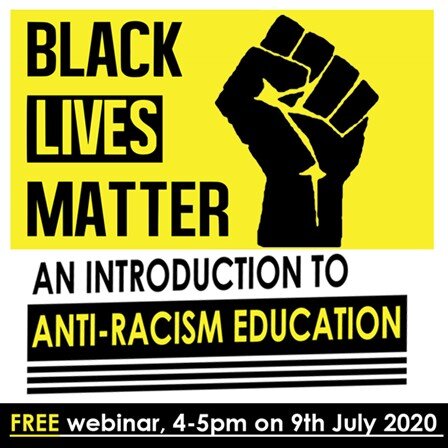Black Lives Matter: Anti-Racism Education
We talk to Katie Bayley an English teacher at Notre Dame High School, Sheffield about her webinar on Anti-Racism Education in conjunction with the Black Lives Matter movement. Notre Dame High School is the lead secondary school for The Sheffield SCITT.
The webinar has attracted a huge amount of interest and the audience is ever growing. If you are interested in booking a place on the FREE Anti-Racism Education webinar on 9th July at 4pm, click here.
To read the webinar poster please click here.
“We can learn a lot from our young people - and they are ready and waiting for us as educators to make space for these important conversations in our classrooms, and for us to follow it up with meaningful, structural action.”
Please can you tell us all about the Anti-Racism Education webinars?
We are on the cusp of an important sea change regarding how we think and talk about race in society. Recent events have galvanised individuals, schools, businesses and institutions into action on a global scale. However, in order for us to effect lasting change, we as educators must lead by example and get ready to do the work- work that will be difficult, uncomfortable and challenging. In the first Anti-Racism Education webinar we will engage with the core principles of Critical Race Theory and Anti-Racism teaching. We will lay the necessary groundwork for building an exploratory, post-colonial climate in the classroom. We will consider some of the likely challenges we may face when talking about race, and crucially, how an awareness of our own bias, combined with an understanding of the theory, can have a transformative effect on our interactions both inside and outside of the classroom.
With the killing of George Floyd by four police officers, and the Black Lives Matter protests that ensued worldwide over the last few days, how do you think the students and teachers have responded?
One thing that I have found really interesting and inspiring over these last few weeks is just how well-informed our young people are on anti-racism discourse. Many of our students are already using terms such as white privilege, anti-blackness, structural racism and white fragility- and they are doing so with insight and eloquence. We can learn a lot from our young people- and they are ready and waiting for us as educators to make space for these important conversations in our classrooms, and for us to follow it up with meaningful, structural action. In terms of the staff response, there has been a noticeable shift in terms of the attitudes and openness expressed by colleagues. The tragic killings of George Floyd, Breonna Taylor and Ahmaud Arbery and the widespread protests have galvanised non-teaching staff, teaching staff, middle leaders and senior leaders into demonstrating their commitment to life-long learning and anti-racism education. Together, we must ensure that this momentum continues and that it leads to lasting change.
What resources would you encourage students and teachers to read or access in order to further educate themselves about racism?
I have a fantastic non-fiction reading list* that I would love to share with you. Many of these texts have had a profound impact on me and the shaping of my world-view. If I had to pick two texts, I would recommend Reni Eddo Lodge’s ‘Why I’m No Longer Talking to White People About Race’ and Dr Robin DiAngelo’s ‘White Fragility’. These two highly-influential texts deconstruct the covert, insidious nature of institutional racism. They also shine a light on some of the typical defensive reactions we often see exhibited in human behaviour when the subject of race is broached. These books will make you view society in a new light, will have you nodding your head in enthusiastic agreement and will inspire you to set up an anti-racism working group in your next school!
*Reading list at the bottom of article.
What steps can teachers take to be actively anti-racist?
We can educate ourselves on anti-blackness and the issues faced by the Black community.
We can make sure that we listen to Black voices and the voices of people of colour- not assuming that we already know and understand.
We can stay updated on recent events, engaging with current issues.
We can learn more about white privilege and we can support the Black community and POC.
The two key words here are listening and learning. This will have a profound impact on your practice in the classroom and your interactions inside and outside of the classroom.
How do you successfully engage students in discussions about racism?
It is important for students to see that you are listening- that you are open to hearing them and learning from them. We can’t expect to have all the answers and how could we? We will get it wrong sometimes, but we should be creating a safe climate in our classrooms that enables us to question and explore issues together. This is a very apt closing question as this will be the focus of our next session! After having laid the groundwork in terms of the key principles of anti-racism pedagogy, our follow-up session will focus on sharing practical strategies for facilitating effective discussion about race in the classroom.
Anti-Racism: Further Reading List
(Non-Fiction)
Why I'm No Longer Talking to White People About Race, Reni Eddo-Lodge
Widespread reporting on aspects of white supremacy--from police brutality to the mass incarceration of Black Americans--has put a media spotlight on racism in our society. Still, it is a difficult subject to talk about. How do you tell your roommate her jokes are racist? Why did your sister-in-law take umbrage when you asked to touch her hair--and how do you make it right? How do you explain white privilege to your white, privileged friend?
In So You Want to Talk About Race, Ijeoma Oluo guides readers of all races through subjects ranging from intersectionality and affirmative action to "model minorities" in an attempt to make the seemingly impossible possible: honest conversations about race and racism, and how they infect almost every aspect of American life.
White Fragility: Why It’s So Hard for White People to Talk About Racism, Robin DiAngelo
Anger. Fear. Guilt. Denial. Silence. These are the ways in which ordinary white people react when it is pointed out to them that they have done or said something that has - unintentionally - caused racial offence or hurt. After all, a racist is the worst thing a person can be, right? But these reactions only serve to silence people of colour, who cannot give honest feedback to 'liberal' white people lest they provoke a dangerous emotional reaction. Robin DiAngelo coined the term 'White Fragility' in 2011 to describe this process and is here to show us how it serves to uphold the system of white supremacy. Using knowledge and insight gained over decades of running racial awareness workshops and working on this idea as a Professor of Whiteness Studies, she shows us how we can start having more honest conversations, listen to each other better and react to feedback with grace and humility.
Natives: Race and Class in the Ruins of Empire, Akala
From the first time he was stopped and searched as a child, to the day he realised his mum was white, to his first encounters with racist teachers - race and class have shaped Akala's life and outlook. In this unique book he takes his own experiences and widens them out to look at the social, historical and political factors that have left us where we are today. Covering everything from the police, education and identity to politics, sexual objectification and the far right, Natives speaks directly to British denial and squeamishness when it comes to confronting issues of race and class that are at the heart of the legacy of Britain's racialised empire.
Brit(ish): On Race, Identity and Belonging, Afua Hirsch
You’re British. Your parents are British. Your partner, your children and most of your friends are British. So why do people keep asking where you’re from? We are a nation in denial about our imperial past and the racism that plagues our present. Brit(ish)is Afua Hirsch’s personal and provocative exploration of how this came to be – and an urgent call for change.
We Need to Talk About Race, Ben Lindsay
It’s time for the Church to start talking about race.
Ben Lindsay offers eye-opening insights into the black religious experience, challenging the status quo in white majority churches. Filled with examples from real-life stories, including his own, and insightful questions, this book offers a comprehensive analysis of race relations in the Church in the UK and shows us how we can work together to create a truly inclusive church community.
So You Want to Talk About Race, Ijeoma Oluo
Widespread reporting on aspects of white supremacy--from police brutality to the mass incarceration of Black Americans--has put a media spotlight on racism in our society. Still, it is a difficult subject to talk about. How do you tell your roommate her jokes are racist? Why did your sister-in-law take umbrage when you asked to touch her hair--and how do you make it right? How do you explain white privilege to your white, privileged friend?
In So You Want to Talk About Race, Ijeoma Oluo guides readers of all races through subjects ranging from intersectionality and affirmative action to "model minorities" in an attempt to make the seemingly impossible possible: honest conversations about race and racism, and how they infect almost every aspect of American life.
We Were Eight Years in Power, Ta-Nehisi Coates
From 2008-2016, the leader of the free world was a black man. Obama's presidency reshaped America and transformed the international conversation around politics, race, equality. But it attracted criticism and bred discontent as much as it inspired hope - so much so, that the world now faces an uncertain future under a very different kind of US President. In this essential new book, Ta-Nehisi Coates takes stock of the Obama era, speaking authoritatively from political, ideological and cultural perspectives, drawing a nuanced and penetrating portrait of America today.
Between the World and Me, Ta-Nehisi Coates
In the 150 years since the end of the Civil War and the ratification of the Thirteenth Amendment, the story of race and America has remained a brutally simple one, written on flesh: it is the story of the black body, exploited to create the country's foundational wealth, violently segregated to unite a nation after a civil war, and, today, still disproportionately threatened, locked up and killed in the streets. What is it like to inhabit a black body and find a way to live within it? And how can America reckon with its fraught racial history?
Between the World and Me is Ta-Nehisi Coates’ attempt to answer those questions, presented in the form of a letter to his adolescent son.
Me and White Supremacy: Combat Racism, Change the World and Become a Good Ancestor, Layla Saad
Me and White Supremacy shows readers how to dismantle the privilege within
themselves so that they can stop (often unconsciously) inflicting damage on people of colour, and in turn, help other white people do better, too. When Layla Saad began an Instagram challenge called #MeAndWhiteSupremacy, she never predicted it would spread as widely as it did. She encouraged people to own up and share their racist behaviours, big and small. She was looking for truth, and she got it. Thousands of people participated, and over 90,000 people downloaded the book.
Black and British, David Olusoga
Drawing on new genealogical research, original records, and expert testimony, Black and British reaches back to Roman Britain, the medieval imagination, Elizabethan ‘blackamoors’ and the global slave-trading empire. It shows that the great industrial boom of the nineteenth century was built on American slavery, and that black Britons fought at Trafalgar and in the trenches of both World Wars. Black British history is woven into the cultural and economic histories of the nation. It is not a singular history, but one that belongs to us all. Unflinching, confronting taboos and revealing hitherto unknown scandals, Olusoga describes how the lives of black and white Britons have been entwined for centuries.
The Fire Next Time, James Baldwin
'We, the black and the white, deeply need each other here if we are really to become a nation'
James Baldwin's impassioned plea to 'end the racial nightmare' in America was a bestseller when it appeared in 1963, galvanising a nation and giving voice to the emerging civil rights movement. Told in the form of two intensely personal 'letters', The Fire Next Time is at once a powerful evocation of Baldwin's early life in Harlem and an excoriating condemnation of the terrible legacy of racial injustice.
The Good Immigrant, Nikesh Shukla
How does it feel to be constantly regarded as a potential threat, strip-searched at every airport? Or be told that, as an actress, the part you’re most fitted to play is ‘wife of a terrorist’? How does it feel to have words from your native language misused, misappropriated and used aggressively towards you? How does it feel to hear a child of colour say in a classroom that stories can only be about white people? How
does it feel to go ‘home’ to India when your home is really London? What is it like to feel you always have to be an ambassador for your race? How does it feel to always tick ‘Other’? Bringing together 21 exciting black, Asian and minority ethnic voices emerging in Britain today, The Good Immigrant explores why immigrants come to the UK, why they stay and what it means to be ‘other’ in a country that doesn’t seem to want you, doesn’t truly accept you – however many generations you’ve been here – but still needs you for its diversity monitoring forms.
















